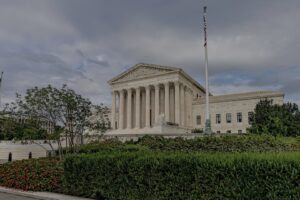Background
Last year, I authored an article for Business Law Today discussing the ethical obligations of lawyers in connection with potential searches of confidential information on their portable electronic devices by the U.S. Customs and Border Protection (CBP) and Immigration and Customs Enforcement (ICE)—both agencies within the Department of Homeland Security (DHS).[1] This companion article briefly considers the ethical obligations in this scenario of judges—including business court judges and bankruptcy judges—under the canons of judicial conduct. Like lawyers, judges should consider whether consenting to a device search by a CBP or ICE agent is compatible with their professional responsibilities.
Rather than reiterate information about current CBP and ICE policies as background, the reader should refer to that earlier article.
Sources of Rules and Principles of Judicial Ethics
Judges of the States and U.S. Territories
The responsibilities of a state judge are set forth in the applicable code of judicial conduct (CJC) for the state in which he or she is a judicial officer;[2] guidance and interpretations on the meaning of individual provisions are periodically issued by the appropriate authorities, whether judicial advisory committees or similar bodies, or judicial conduct commissions in connection with disciplinary proceedings, which, if appealed, may also lead to interpretations by the jurisdiction’s court of last resort. In addition, interpretations of the MCJC are periodically issued by the ABA Standing Committee on Ethics and Professional Responsibility. These interpretations, although not binding on judges in any jurisdiction, can be influential for interpretation of identical or substantially identical provisions in the relevant jurisdiction’s CJC.[3]
Part-time judges are also bound by the CJC. To the extent that they are also practicing lawyers, however, they should be aware of pertinent obligations under applicable rules of professional conduct as well. (Although full-time judges are usually members of the bar, they may not practice law (MCJC Rule 3.10), so the latter set of rules are largely inapplicable to them).
Federal Judges
Federal judges are subject to statutory rules of judicial conduct and to the Code of Conduct for United States Judges.[4] Interpretive guidance is also available in the form of advisory opinions issued by the Codes of Conduct Committee of the Judicial Conference of the United States.
Pertinent Principles of Judicial Ethics
Compliance with Law. MCJC Rule 1.1 requires judges to comply with the “law”; the comparable provision in the Federal CJC is Canon 2A. The purpose of these provisions is central to judicial ethics—avoiding both the appearance of impropriety and diminishing public confidence in the judiciary. Assuming, arguendo, that border searches of personal electronic devices are authorized by existing federal statutes,[5] there can be no civil disobedience by a judge of CBP and ICE policies.
Avoiding Abuse of the Prestige of Judicial Office. MCJC Rule 1.3 prohibits judges from using or attempting to use the prestige of judicial office to gain personal advantage of deferential treatment of any kind; the comparable provision of the Federal CJC is Canon 2B.[6] Thus, a judge should avoid any conduct that might be, or be construed as, an attempt to use the cachet of judicial authority to intimidate or cajole a border official wishing to search any of the judge’s electronic devices.[7]
Nonpublic Information. Perhaps the most pertinent provision of the MCJC is Rule 3.5,[8] although its language creates some ambiguity. Like its predecessor, Canon 3(B)12, the rule prohibits intentional disclosure of use of “nonpublic information acquired in a judicial capacity for any purpose unrelated to the judge’s judicial duties.” “Nonpublic information” is a term of art specific to this rule; initially it is defined, somewhat circularly, as “information unavailable to the public,” but the definition goes on to provide a nonexclusive list of examples: “information that is sealed by statute or court order or impounded or communicated in camera, and information offered in grand jury proceedings, presentencing reports, dependency cases, or psychiatric reports.” As electronic filing becomes more ubiquitous, judges are increasingly likely to have these sorts of pleadings or documents on their portable electronic devices.
One might well ask whether a border search of an electronic device qualifies as an “intentional” disclosure of nonpublic information acquired in a judicial capacity. That is certainly an open interpretive question. Given the breadth accorded the concept of “intent” in tort law and criminal law, however, it would be dicey in a disciplinary proceeding to hang one’s hat on such an argument, especially where the expected retort would be that the judge knew or reasonably should have known that his or her electronic devices would potentially be subject to search when traveling abroad, and that such a search would unduly risk the proscribed disclosure.
Some Concluding Observations
The following are worthy considerations by any judge anticipating cross-border travel:
- Consider whether it is necessary to bring with you any electronic device containing confidential or privileged information. (If you’re going on vacation, the foolproof solution is to enjoy yourself and leave the device behind!)
- If you absolutely must bring one or more portable electronic devices along, make sure each one is thoroughly scrubbed of all privileged or confidential information. Note that merely deleting files may not be adequate to remove them completely. Alternatively, consider acquiring an electronic device exclusively for use during foreign travel and avoid, to the maximum extent possible, placing confidential or privileged information thereon.
- Merely encrypting privileged or confidential information on a device is no guarantee of its remaining confidential. Remember that border agents may demand that you provide password or other decrypting information, and failure to do so can lead to your device being seized and detained for a period of time.
- Advise the border agent of the existence of any privileged material on the device in question.
- Finally, be cognizant of the location and content of all privileged and confidential information on each device you bring across the border, and be prepared when advising a federal officer of the existence of privileged or confidential information to identify for the officer specific files or categories of files, and any other information that will help the officer segregate such information.
[1] Also noteworthy are some 2017 reports that the Transportation Security Administration (TSA) is implementing heightened screening procedures with respect to electronic devices for purely domestic flights. See, e.g., Russ Thomas, TSA Implements new screening procedures in Montana, KPAX.com, Dec. 14, 2017; Joel Hruska, TSA Will Now Screen All Electronics ‘Larger Than a Cell Phone’, Extreme Tech, July 26, 2017.
[2] Specific references in this article will be to the ABA Model Code of Judicial Conduct (MCJC). Judges should consult the version adopted in their respective states.
[3] The most recent example is ABA Ethics Committee Formal Op. 478, Independent Factual Research by Judges Via the Internet (Dec. 8, 2017). Shortly thereafter, this opinion was endorsed by the Connecticut Committee on Judicial Ethics in Informal Op. 2018-4 (Feb. 15, 2018). For discussion of the ABA opinion, see Keith R. Fisher, New ABA Ethics Opinion Explores the Prohibition on Independent Fact Research by Judges, NCSC Center for Judicial Ethics (2018).
[4] See Admin. Office of the U.S. Courts, Code of Conduct for United States Judges [hereinafter Federal CJC]. The Federal CJC is applicable to U.S. circuit judges, district judges, Court of International Trade judges, Court of Federal Claims judges, bankruptcy judges, and magistrate judges, and has been adopted by the U.S. Tax Court, the Court of Appeals for Veterans Claims, and the Court of Appeals for the Armed Forces.
[5] Interestingly, the MCJC defines “law” somewhat broadly to include statutes, although not broadly enough expressly to include regulations or agency policy statements. The Federal CJC contains no definition of “law.” The commentary to Canon 2A, which also does not expressly include regulations or agency policy statements, seems more inclusive: “Because it is not practicable to list all prohibited acts, the prohibition [against impropriety and the appearance of impropriety] is necessarily cast in general terms that extend to conduct by judges that is harmful although not specifically mentioned in the Code. Actual improprieties under this standard include violations of law, court rules, or other specific provisions of this Code.” (Emphasis added).
[6] Canon 2B provides in pertinent part: “A judge should [not] lend the prestige of the judicial office to advance the private interests of the judge or others . . . .”
[7] Cf. In re Muller, No. 069351, Presentment (N.J. Sup. Ct. Adv. Comm. Judl. Cond. 2011), Final Order (N.J. 2011) (reprimanding judge who made 9-1-1 call in connection with service of subpoena on her husband in unrelated matter for repeatedly identifying her judicial position when rebuking responding officers); In re Heiple, 97-CC-1 (Ill. Cts. Comm’n 1997) (censuring state chief justice for avoiding speeding tickets by producing judicial identification credential rather than driver’s license when stopped by police on several occasions and saying, “Don’t you know who I am?”).
[8] The closest analogue in the Federal CJC is found in Canon 4, which relates to extrajudicial activities. Canon 4D(5) provides, “A judge should not disclose or use nonpublic information acquired in a judicial capacity for any purpose unrelated to the judge’s official duties.” This language, in contrast to MCJC Rule 3.5, is not modified by the adjective “intentional.” It is uncertain, however, whether this language, although unambiguous, applies to general disclosures, as it is part of Canon 4D, which is headed “Financial Activities.”
















